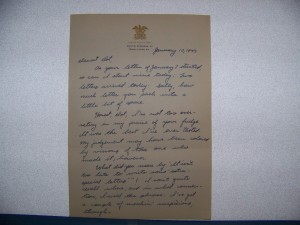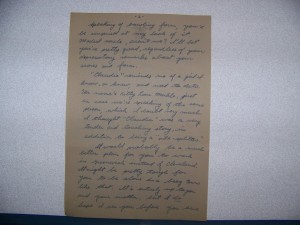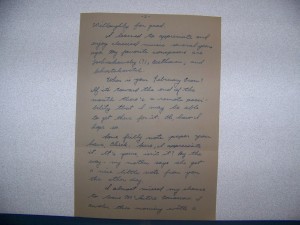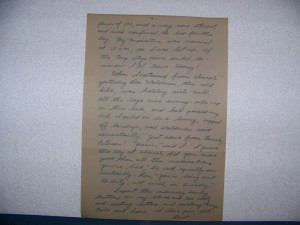Here’s a rather disjointed letter from Dart, causing me to wonder if one or more of Dot’s letters have been lost. He refers to some things I don’t recall them discussing before.
He repeats some of his previous complements; the fudge was the best he ever tasted, he’s sure she’s being overly modest when she disparages her bowling form and scores, he likes her new stationery (because it carries letters from her), etc.
He agrees that it would probably be better for her to get her required practicum in Greenwich rather than Cleveland because then she wouldn’t be alone in a big city. He sincerely hopes he’ll have a chance to see her before her days in Willoughby come to an end.
He nearly missed his chance to leave the hospital and return to duty when he awoke with a fever of 100 and a very sore throat. After being confined to bed for the remainder of the day, his temperature dropped. If it stays down until the morning, he’ll be discharged to boot camp.
He tells a story of being examined by another doctor and uses an ethnic term to describe him. This part of the letter really bothers me, not only because it is offensive to my 21st-century ear, but because it paints a picture so contrary to the man I knew as my father. He always enjoyed the company of a diverse group of friends and co-workers. He valued the flavor that people from different races, religions and backgrounds brought to everyday life. He appreciated humor that was steeped in cultural differences. I never once heard him use a racial or ethnic slur. Furthermore, had he learned that any of his children had, we would have had a meal of Ivory soap. Can I chalk up his use of such language to the changing times, or is this simply a case of never completely knowing a person, no matter how much you love them? I sure hope it’s the former.




I believe that the 21st century craze for “political correctness” has flavored our perceptions of terms used 7 decades ago. I did hear Dad use what today would be considered “offensive” terms – not often, not in anger and NEVER as a pejorative. This language mis-alignment is similar to the communication differences between the time these letters were written and today’s mobile, social media, texts, tweets, etc.